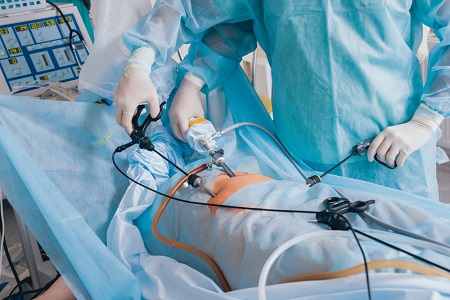One of the most common questions being asked of surgeons today is whether a laparoscopic procedure can be done instead of traditional surgery. While laparoscopy is a major advancement in surgery, it is not a miracle option that can be applied in every case for every patient needing surgery. Laparoscopy has its benefits, but the procedure cannot be used for every surgery. Those with plans for surgery need to understand what laparoscopy is and the circumstances under which it can be done. Understanding the details of the planned procedure will give patients the comfort and security that comes from knowing what is involved.
Laparoscopy Is Not the Same as Laparoscopic Surgery
To begin with, it is essential to understand what a laparoscope (the high-tech instrument that gives the procedure its name) is. It is a thin telescopic rod with a minute but high-definition video camera at the tip. The surgeon inserts the laparoscope through a small incision and the video camera gives him a clear real-time video of the affected organ that is being treated. This is a major aid in confirming a diagnosis and determining the extent of the condition so that surgery can be planned and executed with more precision. This procedure is laparoscopy.
In many cases, laparoscopy may be used to confirm that the surgery can be done using minimally invasive procedures which typically result in faster procedures and a more rapid patient recovery. To do a laparoscopic surgery, the surgeon will create a small incision to insert the laparoscope and then make one or more small incisions through which special minute surgical tools can be inserted. By watching the real-time video, the surgeon can use the special surgical tools to perform the surgery without the need for a major incision and the additional trauma, patient discomfort and longer recovery time that a large incision would cause. This is laparoscopic surgery.
While laparoscopic surgery, when viable, offers many benefits for the patient, it should not always be considered a minor procedure. Many laparoscopic surgeries are major procedures and will require the care and recovery that such surgeries demand.
Also Read: Why Multispecialty Hospitals Are the Best
What Surgeries Are Commonly Done Using a Laparoscope?
While the scope for laparoscopic surgery is continually expanding, today the procedure is most often used for abdominal surgeries. These include:
- Biopsies
- Appendectomy – appendix removal
- Cholecystectomy – gallbladder removal
- Stone cyst, polyp and fibroid removal
- Removing small tumours
- Removing ectopic pregnancies
- Tubal ligation and also reversing the procedure
- Vaginal and urethral reconstruction surgery
- Testicle correction surgery
- Endometriosis surgery
- Hernia repair surgery
- Esophageal anti-reflux surgery
- Rectal prolapse repair surgery
- Gastric bypass surgery
The Procedure
The details of specific laparoscopic surgeries may vary but in general, this is what happens:
- You will be taken to the operation theatre and placed on an operating table.
- You may be positioned so that your head is lower than your feet.
- You will be given general anesthesia.
- The surgeon will make a small incision, usually near the navel or under the rib cage.
- A tube is inserted into the incision and a special gas is pumped into the abdomen. This inflates the area and makes the organs easier to see and access.
- The gas tube is removed and a laparoscope is inserted.
- Additional small incisions are made through which special tools are used to perform the surgery.
- Once the procedure is complete, the surgical tools are removed and the gas is allowed to escape from the body.
- The incisions are then closed.
Recovery
Once the surgery is over, you will be taken to a recovery area where your vital signs will be monitored while you wake up. You may experience some amount of pain or discomfort upon waking up and if required, you will be given medication to relieve the problems. It is common for some of the gas that was pumped into the abdomen to escape and rise into the shoulder area and this may cause some pain which will also be alleviated by medication.
How long you will be required to remain in the hospital will depend on the nature of the procedure, any other medical problems you may have, your age and other factors. In many cases, patients are able to return home after a few hours or the next day.
Before leaving the hospital, your follow-up examinations will be scheduled and your post-surgery medication plan will be given to you.
It is important to follow the instructions you are given and the precautions you are told to take during the recovery period. Just because the procedure has been minimally invasive, that does not mean that there is no recovery time.
The Benefits of Laparoscopic Surgery
Your surgeon will advise you on the benefits of the procedure but in general, they include:
- Less trauma to the body
- Less blood loss and a lower risk of hemorrhage
- Reduced risk of infection
- Fewer and smaller surgical scars
- A shorter recovery stay in the hospital which means:
- Returning home more quickly to complete the recovery in familiar surroundings
- A lower hospital bill
- Less pain and discomfort during the healing process
- A more rapid return to normal activities
Laparoscopic surgery is a major advancement in surgical procedures but when it can be used will depend on the nature of the medical condition. Only a surgeon will be able to decide on this. For that reason, it is best to go a multispecialty hospital with the most advanced surgical and treatment options, both laparoscopic and traditional, as well as the best surgeons and the specialized departments. In such a hospital, you can be sure that the decision on whether laparoscopic surgery is the right choice for you will be taken by those who are most qualified to make the decision.
Frequently Asked Questions
What is laparoscopic surgery?
Laparoscopic surgery is a minimally invasive surgical technique where small incisions are made to insert a camera and specialized tools, allowing surgeons to operate without a large cut.
What is the difference between laparoscopy and laparoscopic surgery?
Laparoscopy is a diagnostic procedure using a laparoscope to view internal organs, while laparoscopic surgery uses small incisions and tools to perform the actual surgery guided by the laparoscope.
Is laparoscopic surgery safer than open surgery?
Yes, in many cases laparoscopic surgery is considered safer due to smaller incisions, less blood loss, and reduced risk of infection. However, it depends on the patient’s condition and the type of surgery needed.
What are the common types of laparoscopic surgeries?
Common laparoscopic procedures include gallbladder removal, appendectomy, hernia repair, endometriosis treatment, and bariatric surgeries like gastric bypass.
How long does it take to recover from laparoscopic surgery?
Recovery time varies by procedure, but most patients return to normal activities within a few days to a week, with less pain and faster healing than open surgery.
Can all surgeries be done laparoscopically?
No, not all surgeries are suitable for laparoscopy. The feasibility depends on the type of condition, its severity, and the patient’s overall health. Your surgeon will determine the best approach.


